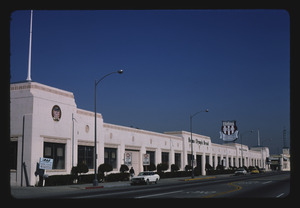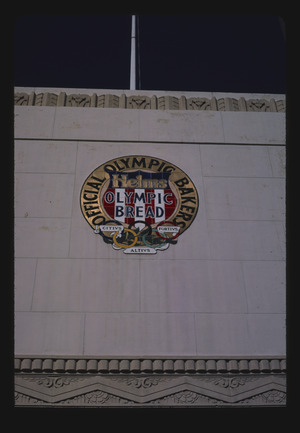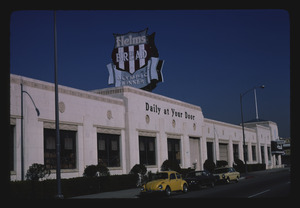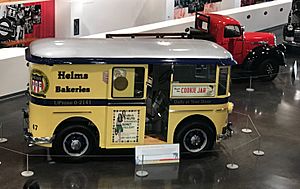Helms Bakery facts for kids

Helms Olympic Bread building, Culver City, California, 1977
|
|
| Private company | |
| Industry | Food (bakery) |
| Founded | March 2, 1931 |
| Defunct | 1969 |
| Headquarters | Los Angeles/Culver City, California, U.S. |
| Products | Bread, cake |
| Owner | Paul Helms |
Helms Bakery was a famous bakery in Southern California that delivered fresh bread and treats right to people's doors. It operated from 1931 to 1969, serving many neighborhoods in the Los Angeles area. Today, the old bakery buildings in Culver City have been transformed into a cool place called the Helms Design District. Here, you can find shops, restaurants, and furniture showrooms.
Contents
The Story of Helms Bakery
Starting a Sweet Business
In 1926, a man named Paul Helms moved to Southern California. He started building his bakery in 1930. On March 2, 1931, the Helms Bakery officially opened its doors. It began with 32 employees and 11 special delivery vehicles. Paul Helms liked to call these vehicles "coaches" instead of trucks.
The bakery's motto was "Daily at Your Door." Every weekday morning, many Helms coaches would leave the bakery. They traveled all over the Los Angeles Basin to deliver fresh bread and cakes. Each coach had a driver, known as a "Helmsman." They would drive through neighborhoods, blowing a whistle to let people know they were there. If someone wanted to buy something, they would put a blue sign with an "H" in their window.
Baking for Champions: The Olympics Connection
Helms Bakery became very famous in 1932. That year, the 1932 Summer Olympics were held in Los Angeles. Paul Helms won a special contract to supply bread for all the athletes! His slogan proudly announced, "Olympic Games Bakers - Choice of Olympic Champions."
The bakery's connection to the Olympics continued. In 1936, Germany even asked for Helms' bread recipes for their Olympic teams. Later, U.S. teams competing in London and Helsinki also requested Helms bread. The early delivery vehicles and bread wrappers often showed the Olympic symbol.
Paul Helms passed away in 1957, but his family kept the business going. The delivery network grew even larger, reaching cities like Fresno, San Bernardino, and San Diego.
Bread in Space: Apollo 11
In its final year of operation, Helms Bakery achieved something truly out of this world! The company won a contract to provide "the first bread on the moon." This bread was part of the supplies for the Apollo 11 space mission in 1969.
The Bakery Closes
Sadly, Helms Bakery stopped its operations in 1969. The way people shopped was changing, with more families going to grocery stores. This meant that door-to-door delivery was not as needed anymore. After the bakery closed, the Marks family bought the buildings in the early 1970s. They started to give the historic buildings a new purpose.
Cool Delivery Trucks
Helms Bakery was well-known for its unique delivery vehicles. These trucks were usually painted in a bright pale yellow color. Over the years, Helms used different types of vehicles, including trucks from companies like DIVCO and Twin Coach. Eventually, they switched to General Motors Panel Vans.
Where to See a Helms Truck Today
If you're interested in seeing one of these cool vintage trucks, some are on display in museums:
- The Lyon Air Museum in Santa Ana, California, has a 1940s Faegol / Twin Coach.
- The Lions Automobilia Museum in Rancho Dominguez, California, displays a 1962 Chevrolet.
- The LeMay Car Museum in Tacoma, Washington, has a 1950s Twin Coach.
Helms Bakery Today
The old bakery location in Culver City is now a lively place called the Helms Design District. It's home to many restaurants, a bakery marketplace, and stores that sell design and home furnishings.
In 2003, the famous "Helms Olympic Bakery" sign was carefully restored and lit up again. It cost $60,000 to bring the iconic sign back to life! In 2025, a new bakery opened in the district. It offers modern bakery items that remind people of the delicious treats from the original Helms era.
There's also an active Facebook group called "Helms Bakery Truck" where fans share memories and photos. The Los Angeles Museum of Natural History even has a collection of items related to Helms Bakery, like old signs and bread wrappers.
See also
- Helms Athletic Foundation
 | Emma Amos |
 | Edward Mitchell Bannister |
 | Larry D. Alexander |
 | Ernie Barnes |




